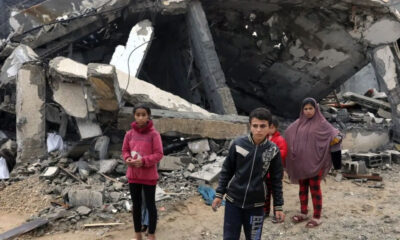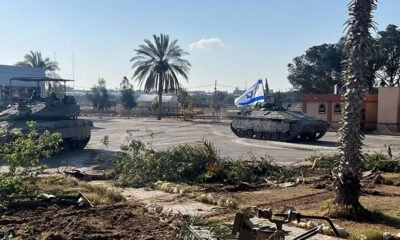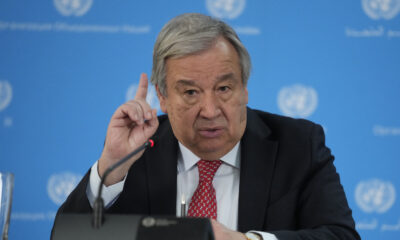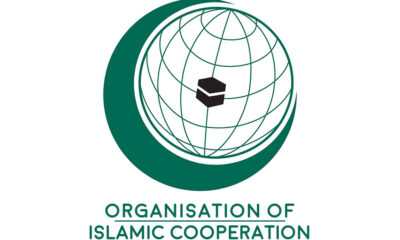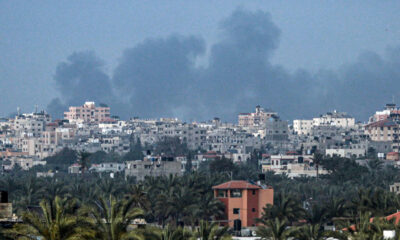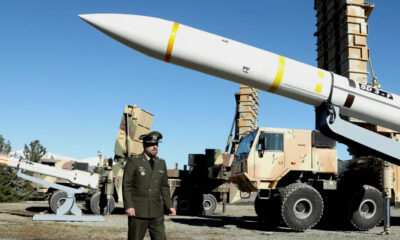International
Israel fires two officers after finding grave errors in strike on aid workers
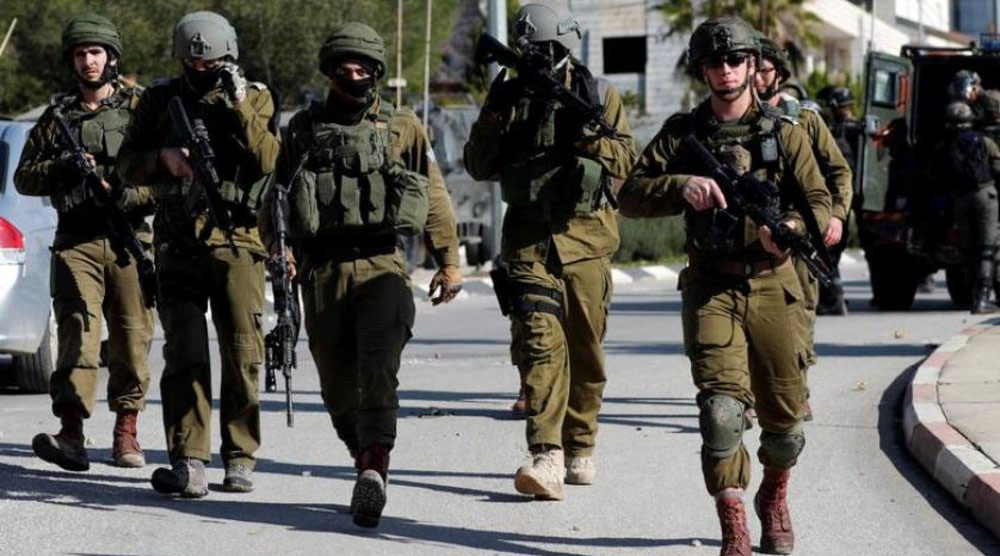
Israel fires two officers after finding grave errors in strike on aid workers
The Israeli military dismissed two officers and formally reprimanded senior commanders after an inquiry into the killing of seven aid workers in an air strike in Gaza this week found serious errors and breaches of procedure, the military said.
The inquiry found Israeli forces mistakenly believed they were attacking Hamas gunmen when drone strikes hit the three vehicles of the World Central Kitchen aid group late on Monday night, and that standard procedures had not been followed.
“The strike on the aid vehicles is a grave mistake stemming from a serious failure due to a mistaken identification, errors in decision-making, and an attack contrary to the Standard Operating Procedures,” the military said in a statement issued on Friday.
The killing of the seven aid workers, who included citizens of Britain, Australia and Poland, a dual U.S. Canadian national and a Palestinian colleague, triggered global outrage this week.
In a call with Israeli Prime Minister Benjamin Netanyahu on Thursday, U.S. President Joe Biden threatened a shift in U.S. policy towards Israel unless it reduced harm to civilians in Gaza, which already depended on aid before the war and has seen hunger spread since fighting began six months ago.
Following the publication of the findings, World Central Kitchen demanded an independent commission to investigate the incident. “Without systemic change, there will be more military failures, more apologies and more grieving families,” according to a statement published by WCK.
READ ALSO:
- Court convicts Bobrisky for naira abuse
- Worshippers narrowly escape as truck crashes into Niger mosque
- Six Russian warplanes destroyed, 20 feared killed in Ukraine drone strike
The army had already acknowledged that the seven WCK employees had been killed in an airstrike but the unusually swift investigation underlined the impact the incident has had on world public opinion.
Jose Andres, the chef who founded World Central Kitchen, said this week the seven workers had been targeted “systematically, car by car” as they moved to seek shelter when their vehicles were hit in succession.
The military said it had dismissed a brigade chief of staff with the rank of colonel and a brigade fire support officer with the rank of major, and formally reprimanded senior officers including the general at the head of the Southern Command.
The case was also handed over to the military advocate general to consider a possible criminal investigation, the military said.
BAG MISTAKEN FOR A RIFLE
The convoy hit was the second of four planned missions to deliver some 200 tons of food brought to Gaza by sea last month under the management of WCK as part of efforts to increase the amount of aid getting into the enclave.
The military said that as the aid convoy the light vehicles were accompanying was travelling down the coastal road in Gaza towards a logistics point late on Monday, armed suspects had climbed on to at least one of the trucks.
The army showed reporters drone footage of a man on top of a lorry firing a rifle, which a spokesperson said had prompted the military to try, unsuccessfully, to contact WCK coordinators.
After the convoy reached a hangar and the trucks were unloaded, the three WCK vehicles had left the location and turned south down the coast road shortly after 11 p.m. (2100 GMT). However, commanders could not see their identifying logos in the dark and did not identify them as belonging to WCK.
Yoav Har-Even, the former major general who led the inquiry, said forces had acted on the mistaken belief that the vehicles had been seized by Hamas fighters.
As the cars left the hangar, one of the men getting into the vehicles had been carrying a bag which the operators watching drone footage took to be a rifle.
“The state of mind at that time was that the humanitarian mission had ended and that they were tracking Hamas vehicles with one suspected gunman, at least one suspected gunman, that they misidentified to be inside one of the three cars,” he told reporters in a briefing.
“They struck that car and then they identified people running out of the car and entering a second car, which is when they decided to strike the second car. Then two people left the second car and entered the third car, which is when they struck the third car.”
Those strikes were in breach of IDF standard operating procedures, he said.
The army pledged to address the fact that it had been unable to see the rooftop logos in the dark as part of a wider package of lessons to draw from the disaster.
Israel fires two officers after finding grave errors in strike on aid workers
Reuters
International
Palestinian envoy lambasts US for arresting protesters

Palestinian envoy lambasts US for arresting protesters
The Palestinian Ambassador to Nigeria, Abdullahi Shawesh, on Thursday, May 16, lambasted the Western World for clamping down on student protesters who were expressing solidarity and sympathy with his country.
He stressed that the arrest and clampdown on protesters negates the Western world’s stand as promoters of freedom of speech.
He said: “When college students express their solidarity and sympathy with the Palestinians, it is labelled as hate speech and anti-Semitism. These students are beaten and harshly treated. Threatened with expulsion from universities, severe sanctions in the future, imprisonment, and facing trial.
“This is the exact meaning of hypocrisy and double standards.”
Shawesh who gave a review of the 223-day battle between the Israeli forces and Hamas, said no fewer than 45,091 Palestinians have been killed, including 15,103 children and 9,961 women.
READ ALSO:
- Police arrest suspected killers of Major-General, others in Imo
- Bandits kill three, abduct 120 in fresh Zamfara community attack
- Police grill Osun monarch, Ataoja of Osogbo, over petition
He also said the battle has consumed 142 journalists and 492 medical staff.
The envoy said no fewer than 10,000 persons have been declared missing.
He added: “78,404 wounded and injured, with 72% of the victims being children and women. 17,000 children live without one or both of their parents.”
Beside the human casualties, Shawesh also listed a number of destructions recorded, which include “243 mosques destroyed and 321 partially damaged. 3 Churches targeted and destroyed, 86,000 housing units completely destroyed and 294,000 partially damaged. 103 schools and universities destroyed. 206 archaeological and heritage sites destroyed, 75,000 tons of explosives materials dropped on Gaza.
“33 hospitals along with 54 health centres were taken out of service. A total of 160 health institutions and 126 ambulances were targeted by the Israeli occupation.”
He said the state of infrastructure devastation has forced 11,000 wounded people to travel for treatment to undergo operations.
He also said that no fewer than “10,000 cancer patients face death due to the lack of medical treatment. 1,095,000 are infected with infectious diseases as a result of displacement. 20,000 cases of viral hepatitis infection due to displacement. Tens of thousands of pregnant women are at risk due to a lack of access to healthcare. There have been 310 cases of health personnel being arrested.”
Palestinian envoy lambasts US for arresting protesters
International
UK says it’s developing radio frequency to blast out drones

UK says it’s developing radio frequency to blast out drones
The United Kingdom is making strides in military technology, developing a cutting-edge weapon using radio waves to counter drones.
Known as the Radio Frequency Directed Energy Weapon (RFDEW), this innovative system utilizes radio waves to disrupt or damage critical electronic components of enemy vehicles and drones, halting their operations or causing them to fall out of the sky.
Operable across land, air, and sea, the RFDEW boasts a range of up to 1 kilometre, with potential for future extensions. Its development follows UK Prime Minister Rishi Sunak’s commitment to increasing defence spending to 2.5% of GDP by 2030.
With an estimated cost of 0.10 Pounds (0.12 dollars) per radio waveshot, the RFDEW offers a cost-effective alternative to conventional missiles and holds promise for effectively countering drone swarms.
READ ALSO:
- Portable out with new song after leaving police custody
- Troops kill ISWAP’s bomb squad commander
- Many students injured as OAU lecture hall ceiling collapses
Utilizing a mobile power source, the technology generates pulses of radio frequency energy in a directed beam, capable of delivering sequenced shots to single or multiple targets. It can be mounted on various military vehicles, enhancing flexibility and adaptability on the battlefield.
Minister of State for Defence Procurement James Cartlidge highlighted the significance of such advancements in enhancing the effectiveness and safety of UK armed forces. He emphasized the importance of defending against unmanned systems, especially in light of recent global conflicts.
The RFDEW system will undergo rigorous testing with British soldiers during summer. Developed under Project Hersa by a collaborative team from the Defence Science and Technology Laboratory (DSTL) and Defence Equipment & Support (DE&S), in partnership with UK industry, this technology represents a significant leap in military capability.
DSTL chief executive Paul Hollinshead underscored the transformative impact of such systems, emphasizing their potential to provide decisive operational advantages and enhance national security. He credited decades of research, expertise, and investment in science and technology for enabling the development of world-class capabilities like the RFDEW.
UK says it’s developing radio frequency to blast out drones
International
Just in: In assassination attempt, Slovakia’s Prime Minister shot multiple times
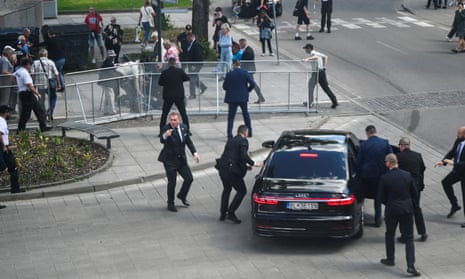
Just in: In assassination attempt, Slovakia’s Prime Minister shot multiple times

Robert Fico, Slovakia’s prime minister, has been taken to hospital in a “life-threatening condition” after he was shot multiple times on Wednesday.
According to his official social media account, the 59-year-old leader was hit in the abdomen outside the House of Culture in the town of Handlova.
Police have detained a suspect. There was no immediate information on the motive.
Reuters reported Zuzana Caputova, President of Slovakia, as condemning the “brutal and ruthless” attack on Fico.
She said in a televised statement, “A physical attack on the prime minister is, first of all, an attack on a person, but it is also an attack on democracy.”
The Russian ambassador to Slovakia Igor Bratchikov also condemned the shooting of Fico.
“I strongly condemn this act of violence and express my conviction of the necessity of punishment for the perpetrators,” Bratchikov said in a letter to Fico that the Russian embassy shared on its Facebook page.
Fico, a third-time premier with the left-wing Smer (Direction) party, won Slovakia’s September 30 parliamentary elections, staging a political comeback after campaigning on a pro-Russian and anti-American message.
-

 Business1 day ago
Business1 day agoDollar crashes against Naira at official market
-

 News20 hours ago
News20 hours agoUpdated: Reps condemn assault on Nasarawa female doctor by patient family
-

 metro1 day ago
metro1 day agoThree police officers sentenced to life imprisonment in Anambra
-

 News1 day ago
News1 day agoWike, Fubara are ego-driven, crude – Reno Omokri
-

 metro2 days ago
metro2 days agoNigerian who killed wife in UK bags life jail
-

 Aviation23 hours ago
Aviation23 hours agoUpdated: We’ll resume Lagos-Dubai flights on October 1, says Emirates
-

 Education3 days ago
Education3 days agoBREAKING: ASUU threatens fresh nationwide strike over federal varsities’ condition
-

 Auto2 days ago
Auto2 days ago150 OEMs, others set for Lagos motor fair, Africa autoparts expo

